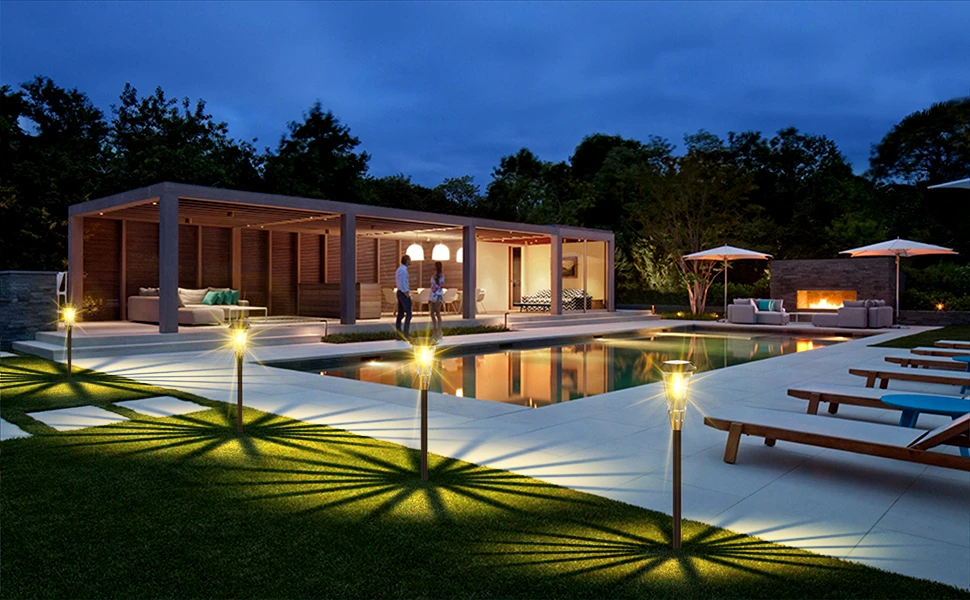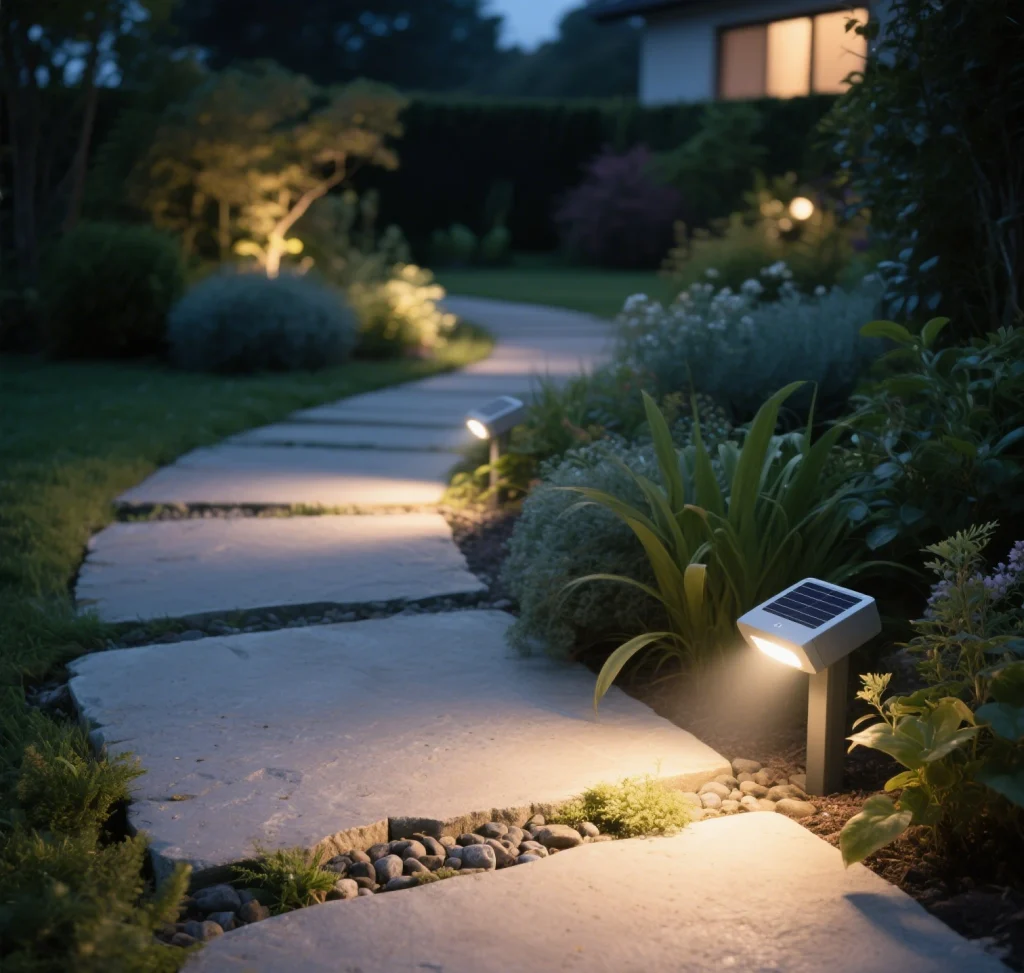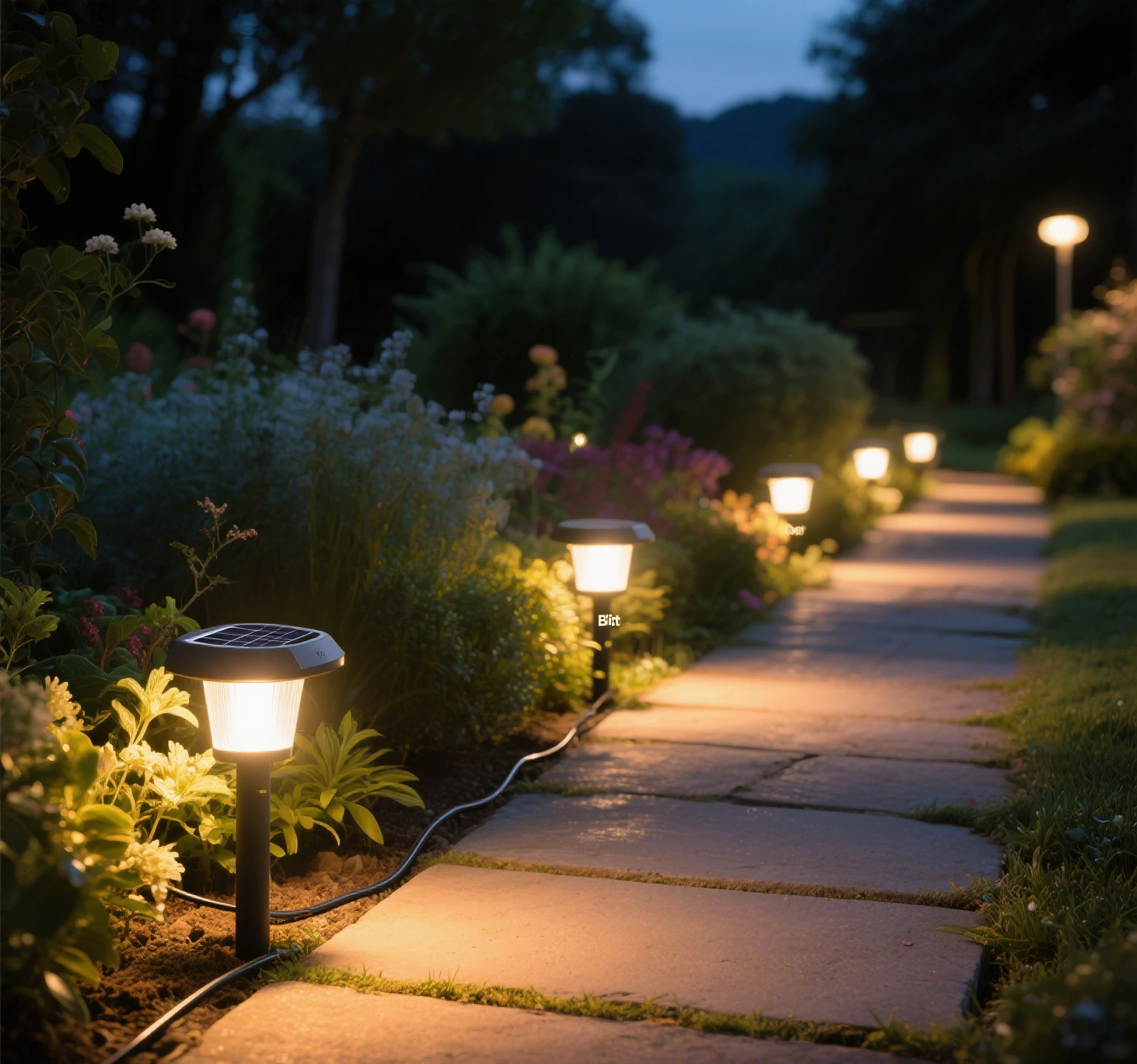Solar garden lights have become a go-to choice for homeowners seeking eco-friendly lighting to enhance their outdoor spaces. These lights harness solar energy to power LED lights through rechargeable batteries, offering a sustainable and cost-effective alternative to traditional electric lighting. However, as with any electrical device, concerns about fire safety may arise. Can solar garden lights catch fire? This article explores the fire risks associated with solar-powered lights, examines their safety features, and provides practical tips to minimize potential hazards, ensuring your garden lighting remains both safe and reliable.

Understanding How Solar Garden Lights Work
To assess the fire risks of solar garden lights, it’s helpful to understand their components and functionality. A typical solar garden light consists of a solar panel, a rechargeable battery, an LED light source, a controller, and a lamp housing. The solar panel converts sunlight into electricity, which is stored in the rechargeable battery for nighttime use. The controller regulates the charging and discharging process, while the lamp housing protects the components from environmental factors. Each part is designed with safety in mind, but issues with quality, maintenance, or misuse can introduce risks.
Are Solar Garden Lights a Fire Hazard?
The short answer is that solar garden lights are generally safe and pose a low fire risk when properly designed, installed, and maintained. Unlike traditional electric lights that rely on high-voltage grid power, solar-powered lights operate on low-voltage solar energy, typically 1.2 to 3.7 volts, which significantly reduces the likelihood of sparking or overheating. However, certain conditions or defects can create rare scenarios where fire hazards may emerge. Below, we explore the potential causes of fire risks and how to mitigate them.
1. Faulty or Low-Quality Batteries
The rechargeable battery is a critical component of solar garden lights, typically using nickel-metal hydride (NiMH) or lithium-ion batteries. Poor-quality batteries or those with manufacturing defects can overheat, leak, or, in extremely rare cases, ignite. For instance, lithium-ion batteries, while efficient, can pose a fire risk if damaged, overcharged, or exposed to extreme temperatures. Overheating may occur if the controller fails to regulate charging properly, causing the battery to enter a state known as thermal runaway, where it generates excessive heat.
High-quality solar garden lights incorporate overcharge protection and temperature sensors in their controllers to prevent such issues. Reputable manufacturers also adhere to strict safety standards, ensuring that batteries meet certifications like UL or CE, reducing the likelihood of fire hazards.
2. Electrical Short Circuits
Though solar garden lights operate on low voltage, a short circuit in the wiring or controller can generate heat, potentially leading to a fire risk if flammable materials like dry leaves or grass are nearby. Short circuits may occur due to water ingress in poorly sealed lamp housing, damaged wiring, or corrosion from prolonged exposure to moisture. Lights with low waterproof ratings, such as IP44 or below, are particularly vulnerable in rainy or humid environments.
3. Poor-Quality Components
Low-cost solar garden lights often use substandard solar panels, controllers, or LED light sources, which can increase the risk of malfunction. For example, a poorly designed controller may fail to regulate the flow of electricity, causing overheating in the battery or LED. Similarly, inferior lamp housing materials may crack or degrade, exposing internal components to moisture or dust, which can lead to electrical faults and potential fire hazards.
4. External Factors
Environmental factors can also contribute to fire risks. If solar garden lights are placed near highly flammable materials, such as dry mulch, paper, or chemical fertilizers, a malfunctioning light could ignite these materials in rare cases. Additionally, prolonged exposure to extreme heat—such as in desert climates—can stress the rechargeable battery or solar panel, potentially leading to overheating.
Safety Features in Modern Solar Garden Lights
Advancements in solar technology have significantly improved the fire safety of solar garden lights. Here are some safety features commonly found in high-quality models:
- Overcharge and Overdischarge Protection: Modern controllers include circuits that prevent the rechargeable battery from overcharging or discharging too deeply, reducing the risk of overheating.
- High Waterproof Ratings: Lights with IP65 waterproof ratings or higher are sealed against water and dust, minimizing the chance of short circuits.
- Temperature Sensors: Advanced solar garden lights monitor battery and controller temperatures, shutting down the system if unsafe levels are detected.
- Certified Components: Reputable brands use batteries and LEDs that meet international safety standards, ensuring reliability and reducing fire risks.
These features make well-designed solar-powered lights exceptionally safe, with fire hazards being rare when lights are sourced from trusted manufacturers.

How to Minimize Fire Risks with Solar Garden Lights
While the fire risk associated with solar garden lights is minimal, proactive steps can further enhance their fire safety. Here are practical tips to ensure your garden lighting remains safe:
1. Choose High-Quality Products
Invest in solar garden lights from reputable brands that prioritize safety. Look for models with monocrystalline solar panels, lithium-ion batteries with battery management systems (BMS), and IP65 waterproof ratings or higher. Check for safety certifications like UL, CE, or RoHS, which indicate compliance with rigorous standards. Reading customer reviews and checking warranty periods can also help identify reliable products.
2. Proper Installation
Install solar garden lights in areas free from flammable materials, such as dry grass, leaves, or wooden structures. Ensure the solar panel receives adequate sunlight (6-8 hours daily) to prevent strain on the rechargeable battery due to undercharging. Avoid placing lights in areas prone to flooding or excessive moisture unless they have high waterproof ratings.
3. Regular Maintenance
Routine maintenance is key to preventing fire hazards. Clean the solar panel every 1-2 months to remove dirt, dust, or debris that could reduce efficiency and strain the battery. Use a soft cloth and mild dish soap to avoid scratching the panel. Inspect the lamp housing for cracks, corrosion, or water ingress, and replace damaged units promptly. Check the rechargeable battery for signs of swelling or leakage, and replace it with a compatible, high-quality battery if needed.
4. Monitor Environmental Conditions
In extreme weather, such as intense heat or freezing temperatures, check your solar garden lights regularly. Store portable lights indoors during harsh winters to protect the battery from cold-induced damage. In hot climates, ensure the lamp housing is not covered by debris that could trap heat and stress the controller or battery.
5. Avoid Modifications
Do not attempt to modify or repair solar garden lights unless you have technical expertise. Tampering with the controller, battery, or wiring can introduce fire risks by causing short circuits or improper operation. If a light malfunctions, contact the manufacturer or replace the unit.
What to Do If You Suspect a Fire Risk
If you notice signs of a potential fire hazard—such as a solar garden light emitting smoke, unusual heat, or a burning smell—act immediately:
- Turn Off the Light: If the light has an on/off switch, disable it to stop electrical activity.
- Remove Flammable Materials: Clear any dry leaves, grass, or other flammable items from the area.
- Inspect and Replace: Check the battery, controller, and lamp housing for damage. Replace the unit if it shows signs of malfunction.
- Contact the Manufacturer: Report the issue to the manufacturer for guidance or warranty support.
In the unlikely event of a fire, use a fire extinguisher rated for electrical fires (Class E) and follow local emergency protocols.
The Broader Context: Safety and Sustainability
Solar garden lights are among the safest outdoor lighting options available, especially when compared to high-voltage electric systems. Their reliance on solar energy eliminates the need for complex wiring, reducing fire risks associated with electrical faults. Additionally, solar-powered lights contribute to a lower carbon footprint, making them an eco-friendly lighting choice. By choosing high-quality products and maintaining them properly, you can enjoy both fire safety and environmental benefits.
Addressing Common Misconceptions
Some myths about solar garden lights and fire risks persist. For example, some believe that solar panels can ignite simply by absorbing sunlight. In reality, solar panels generate low-voltage electricity and do not produce enough heat to cause a fire under normal conditions. Another misconception is that lithium-ion batteries are inherently dangerous. While they carry a small fire risk if damaged, modern battery management systems and safety certifications minimize this concern in quality products.
The Role of Technology Advancements
Recent innovations in solar technology are further enhancing the fire safety of solar garden lights. For instance, smart controllers with IoT integration allow real-time monitoring of battery health and temperature, alerting users to potential issues. Monocrystalline solar panels are more efficient, reducing strain on the battery and minimizing overheating risks. Additionally, improved lamp housing materials, such as UV-resistant plastics or stainless steel, enhance durability and protect against environmental damage.
Conclusion
Solar garden lights are highly unlikely to catch fire when properly designed, installed, and maintained. Their low-voltage operation, combined with safety features like overcharge protection and IP65 waterproof ratings, makes them a safe choice for eco-friendly lighting. By selecting high-quality solar-powered lights, performing regular maintenance, and following proper installation practices, you can virtually eliminate fire risks while enjoying bright, sustainable garden lighting. With the right care, your solar garden lights will illuminate your outdoor spaces safely and reliably for years to come.

Comments